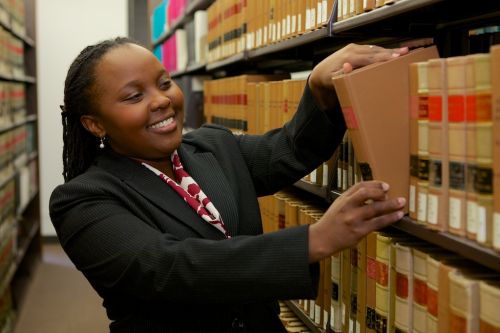Jan 18, 2013
DePaul law student parlays contest win into career connections and opportunities
DePaul law student parlays contest win into career connections and opportunities
CHICAGO—When DePaul University College of Law student Salome Kiwara-Wilson’s interest in cultural heritage law sparked her to enter the Lawyers’ Committee for Cultural Heritage Preservation’s recent writing competition, she hoped the experience would be one item she could cross off her “bucket list.” After capturing first place in the competition, Kiwara-Wilson learned that partaking in extracurricular activities can also be a valuable tool for law students looking to land jobs after graduation.
“Taking advantage of these types of opportunities is a great way for law students to show their interest in a particular filed,” said Kiwara-Wilson, a third year law student at DePaul. “I took advantage of the opportunity because it was on my ‘bucket list’. It also turned out to be a great way to network in my field of interest and meet other attorneys with similar interests.”
Kiwara-Wilson’s winning paper, “Restituting Colonial Plunder: The Case for Benin Bronzes and Ivories,” followed the course of the West African Benin bronzes and ivories seized by British troops during the Punitive Expedition of 1897. The expedition ravaged the Benin kingdom, located in what is now Nigeria, and plundered the royal family’s collection of ceremonial art—including a large number of brass plaques. Britain auctioned off much of the artwork to neighboring states to relieve the cost of the elaborate expedition.
When she heard about the opportunity to submit a paper for the LCCHP competition, Kiwara-Wilson drew upon her experience of visiting the collection at the British Museum to explore the question of restituting colonial plunder.
Kiwara-Wilson’s winning paper topped entries from 32 students at 22 different law schools, according to LCCHP executive director, Tess Davis. Davis noted that the latest LCCHP writing contest, which announced its winner in October, 2012, was one of the organization’s most competitive on record. Included in the mission of the Washington, D.C.-based LCCHP is to expose law students to the evolving field of cultural heritage law. The writing competition aims to further that goal.
Winning the contest will allow the 29-year-old Kiwara-Wilson to make valuable contacts in the cultural heritage field and help advance her desire to practice criminal law. “I plan to practice criminal law after graduation,” said Kiwara-Wilson, who hails from Kenya and who earned undergraduate degrees in art history and French from Berea College in Kentucky before attending law school at DePaul. “I don’t think it is a departure from my cultural heritage interests. In my opinion, some of the most interesting cases in the cultural heritage field are criminal cases.”
Taking time to enter the writing competition could be an important step to help Kiwara-Wilson reach her goals. “I think it is important for law students to pursue their interests because it makes the whole law school experience much more fulfilling,” said Kiwara-
Wilson. “You are also likely to think outside the box in looking for a career after law school, and look for positions that allow you to practice law while pursuing a passion. In addition, if you are in a field that interests you, I think you are likely to be a better attorney.”
Patty Gerstenblith, distinguished research professor of law at DePaul and director of DePaul’s Center for Art, Museum, & Cultural Heritage Law, taught Kiwara-Wilson in a senior seminar and inspired her to parlay her coursework into the winning paper for the LCCHP competition. Gerstenblith, who was appointed by President Barak Obama to serve as chair of the President’s Cultural Property Advisory Committee in the U.S. Department of State in 2011, believes that extracurricular activities go far to position students to be competitive in the current legal employment market.
“Participation in these types of activities gives students recognition in their fields of interest and in the legal community,” said Gerstenblith. “Those who judge the competitions get to know the students in the competition, which is a good way to network. Also, the student gets published, which is excellent exposure. It is also good because employers want people who show passion about their work and do things above and beyond what they are required to do.”

